|
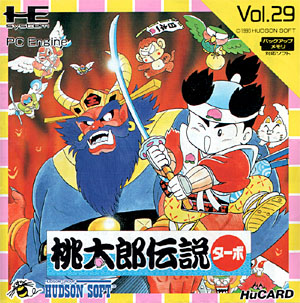
|

|
|
桃太郎伝説ターボ
©1990 Hudson Soft
vol.29
Release : 1991-07-20 (¥5800)
HuCard (4 Mbits) HC90034
Backup Ram
Role Playing Game
|
Momotarō Densetsu Turbo is a traditional role playing game by
Hudson Soft, conversion of a Famicom game originally released
in 1987. The title can be translated as the 'Legend of the Peach Boy'
and the game is loosely based on a really old and popular story from Japanese folklore. The
story starts when an old childless woman finds a giant peach floating down a river.
She brings her treasure back home and as she tries to eat the curious fruit with her
husband, a child suddenly jumps out of it and presents himself. He is Momotarō
and he is sent by the heaven to be their son. His mission is to defeat an outbreak
of demons (Oni in Japanese ) that disguise themselves as humans and walk
the world. Later, Momotarō meets a trio of friends (Inu the
talking dog, Satu the monkey and Kiji the Pheasant)
who promise to help him in his quest. Momotarō Densetsu Turbo, however,
is a one-on-one early role playing game - Momotarō fights against foes on
his own and his companions only randomly help him in battle. Our friend starts
his journey in a small village nearby his parent's house with 100 coins in his
pocket, but there will not be much left after buying a nice wooden sword
(boken) and a couple of rice balls. He soon begins to explore the five
continents and finds his first master - the old hermit challenges him in a
single combat and rewards him with his first magic spell. Simple menus gets
the player to talk to people, use items and spells, equip weapons or activate
Momotarō's buddies. The backup-system allows the player to save
his journey.
|
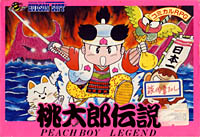 Momotarō Densetsu (literally meaning The adventures of Peach Boy)
was first released for the Nintendo Famicom in 1987. It was then converted
for the PC Engine (1990) and for the Sharp X68000. Countless sequels
followed such as Momotarō Densetsu II (PC Engine, 1990),
Momotaro Densetsu Gaiden (Game Boy(1991).PC Engine(1992),
Famicom(1993)), Shin Momotarō Densetsu (Super Famicom, 1993).
Another long running series, also published by Hudson Soft and called
Momotarō Dentetsu (literally meaning in Japanese Momotarō Electric-Iron,
but more precisely Momotarō Electric Railway) was first released in 1988
for the Famicom system. The gameplay revolves around railroads and trains,
and it has more a 'board-game' feel to it.
Momotarō Densetsu (literally meaning The adventures of Peach Boy)
was first released for the Nintendo Famicom in 1987. It was then converted
for the PC Engine (1990) and for the Sharp X68000. Countless sequels
followed such as Momotarō Densetsu II (PC Engine, 1990),
Momotaro Densetsu Gaiden (Game Boy(1991).PC Engine(1992),
Famicom(1993)), Shin Momotarō Densetsu (Super Famicom, 1993).
Another long running series, also published by Hudson Soft and called
Momotarō Dentetsu (literally meaning in Japanese Momotarō Electric-Iron,
but more precisely Momotarō Electric Railway) was first released in 1988
for the Famicom system. The gameplay revolves around railroads and trains,
and it has more a 'board-game' feel to it.
|
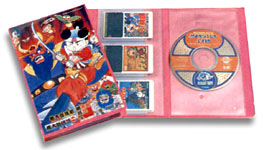 A special Momotarō Densetsu game case was made
available by Hudson Soft (picture on the right).
Players could receive this gift by sending three images (found in
Momotarō Densetsu Turbo, Momotarō Katsugeki
and Momotarō Densetsu II instruction manuals) and
250 yen in postage stamps. The plastic case can
store a total of eighteen HuCards and two CDRoms. (See
the Omake section)
A special Momotarō Densetsu game case was made
available by Hudson Soft (picture on the right).
Players could receive this gift by sending three images (found in
Momotarō Densetsu Turbo, Momotarō Katsugeki
and Momotarō Densetsu II instruction manuals) and
250 yen in postage stamps. The plastic case can
store a total of eighteen HuCards and two CDRoms. (See
the Omake section)
|
G
O
O
D
I
E
S
|
|
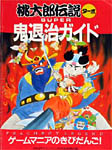
Japanese Guide Book
|
|
|
O
M
A
K
E
|
|
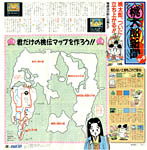

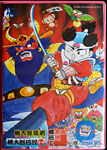
|
|
|
Click on picture to enlarge |
|
|
|
LK

|
|
Add your Pov here !
|
P
O
V
s
|
|
Momotarō Densetsu Turbo is a fun and yet very limited
"primitive" role playing game. We have to keep in mind that the original
Famicom game was released between the first and second
Dragon Quest - Momotarō borrows many features from
Enix's early games, but don't expect anything groundbreaking here.
The game only features Momotarō (despite the animal trio) and
the adventure is quite linear. Also, and like tons of other games in
the genre, get ready for a lot of extremely long leveling up sessions.
Japanese language is also a barrier and many 'non speaking/reading'
players may get stuck later in the game (and it is supposed to use
a lot of Japanese puns). All in all, Momotarō Densetsu Turbo
is a fun game but you'll find much better alternatives.
The PC Engine extensive library of role playing games has a
lot to offer and I'd advice you to check out other titles before
purchasing this one (such as the second episode also available
for the PC Engine system).
|
|
|
|